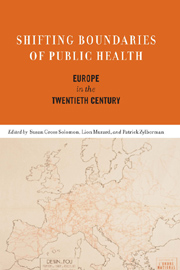Book contents
- Frontmatter
- Contents
- Preface
- Introduction
- Part One Place as Politics
- Part Two Carving Out the International
- Part Three Preserving the Local
- Part Four Navigating between International and Local
- 9 A Matter of “Reach”: Fact-Finding in Public Health in the Wake of World War I
- 10 A Transatlantic Dispute: The Etiology of Malaria and the Redesign of the Mediterranean Landscape
- Selected Bibliography
- List of Contributors
- Index
9 - A Matter of “Reach”: Fact-Finding in Public Health in the Wake of World War I
from Part Four - Navigating between International and Local
Published online by Cambridge University Press: 12 September 2012
- Frontmatter
- Contents
- Preface
- Introduction
- Part One Place as Politics
- Part Two Carving Out the International
- Part Three Preserving the Local
- Part Four Navigating between International and Local
- 9 A Matter of “Reach”: Fact-Finding in Public Health in the Wake of World War I
- 10 A Transatlantic Dispute: The Etiology of Malaria and the Redesign of the Mediterranean Landscape
- Selected Bibliography
- List of Contributors
- Index
Summary
The finding and measurement of social facts are critical components of statecraft. These activities, James Scott tells us, help policy makers to make their society “legible,” to read it, and then to shape it. Fact-finding “away from home” has a different raison d'être: it allows those who craft policies at home to situate their nation in a larger world that they have designated as relevant, and it provides them with baselines against which they may judge that world—and themselves.
The decade after World War I saw exponential growth in travel by public health experts to European countries to find the facts about systems of health care delivery other than their own. Sponsored by international health agencies, national health care administrations, or private philanthropies with transnational aspirations, foreign fact-finding was driven by an acknowledgement that the experiences of countries in fighting disease and promoting wellness might have relevance beyond their borders.
Elsewhere, I have examined the reception by domestic patrons of fact-finding conducted abroad. This chapter engages public health fact-finding at a much earlier stage in the process—before experts extracted “lessons” from their inquiries. It focuses on the decisions that experts (and their patrons) make when they set out to find the facts about public health in “foreign parts.” Which aspects of foreign public health systems and practices are important to know?
- Type
- Chapter
- Information
- Shifting Boundaries of Public HealthEurope in the Twentieth Century, pp. 231 - 268Publisher: Boydell & BrewerPrint publication year: 2008

